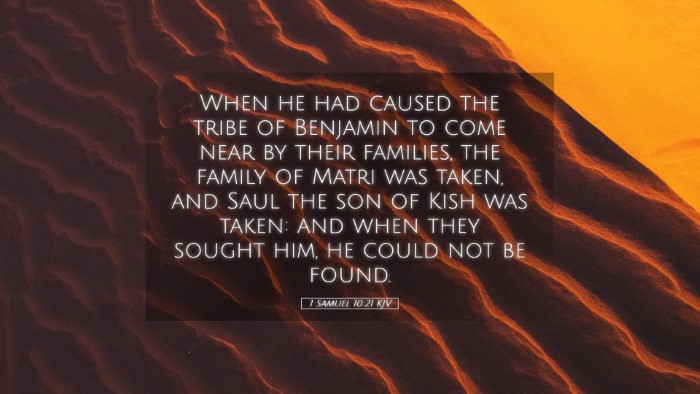Commentary on 1 Samuel 10:21
Text of the Verse: "When he had caused the tribe of Benjamin to come near by their families, the family of Matri was taken, and Saul the son of Kish was taken: and when they sought him, he could not be found."
Introduction
This passage occurs in a significant moment in Israel's history when Saul is being publicly anointed as king. The process of selection is deeply embedded in the communal and spiritual life of the Israelites, demonstrating both the natural and divine elements of leadership.
Contextual Background
The context surrounding 1 Samuel 10:21 is essential for understanding its meaning. Previously, Israel had clamored for a king to govern them like other nations, reflecting a rejection of divine kingship. God responded by selecting Saul, a man of stature and capability. This verse highlights the method of selection used, emphasizing the communal aspect of leadership in ancient Israel.
Verse Analysis
1. The Gathering of the Tribes
This verse describes the tribal gathering of the Israelites, notably the tribe of Benjamin. The act of calling tribes and families underlines the inclusive nature of Israelite society and the importance of communal decision-making. Barnes points out that this public assembly was necessary to emphasize the collective acceptance of Saul as king, which is critical for legitimizing his role.
2. The Method of Selection
Henry elaborates on the method used to identify Saul, noting that it was not merely a random selection. The drawing of lots allowed God's sovereignty to be acknowledged, and the choice of Saul was made clear through divine providence. This method demonstrated that God's hand was upon the entire process, guiding the decision in a manner beyond mere human judgment.
3. The Family of Matri
The family of Matri being singled out from the tribe of Benjamin indicates a divine order in the process of selection. Clarke highlights that this indicates God's ability to work through specific lines and families, reinforcing that leadership can be divinely appointed through particular heritage and lineage. This also underscores the idea of divine sovereignty in the governance of Israel.
4. Saul's Absence
The fact that Saul could not be found when the lot fell upon him is both poignant and significant. Henry remarks that Saul's initial reluctance or inability to step forward reflects humility, showcasing a character that, despite his later failures, had a measure of modesty. It signifies an early indication of his complex character and the challenges he would face in leadership.
Theological Implications
This verse provides significant theological insights regarding leadership, divine will, and human agency. It illustrates the intersection of divine sovereignty and human responsibility, a theme recurrent throughout Scripture.
- Divine Sovereignty: The process of identifying Saul as king is clearly shown to be orchestrated by God.
- Public Acceptance: The need for public acknowledgment of the king's selection reflects the communal nature of governance in Israel.
- Character Assessment: Saul’s hiddenness speaks volumes about his character and foreshadows his future struggles with pride and insecurity.
Implications for Modern Leadership
For pastors, students, and church leaders today, this passage serves as a profound reminder of the nature of spiritual leadership. Just as Saul was chosen in a visible and communal manner, contemporary leaders should seek affirmation from their communities and embrace the humility that follows divine calling.
- Humility in Leadership: Leaders are reminded that their calling is a divine appointment and should approach their roles with humility.
- Community Involvement: The process of leadership should involve communal consensus and acknowledgment, fostering unity within the body of Christ.
- Sovereignty of God: Believers are reassured that God actively guides the paths of leadership, echoing the sentiment that He raises leaders according to His divine timeline and purpose.
Conclusion
1 Samuel 10:21 encapsulates critical aspects of God’s method of choosing leaders. While it presents Saul's election in a public and communal light, it also features themes of humility, divine sovereignty, and the intricate balance required in leadership. To understand this passage fully enables today’s religious leaders and theologians to glean insights into their ministries, reflecting deeply on the nature of their service and leadership roles within the community of faith.


